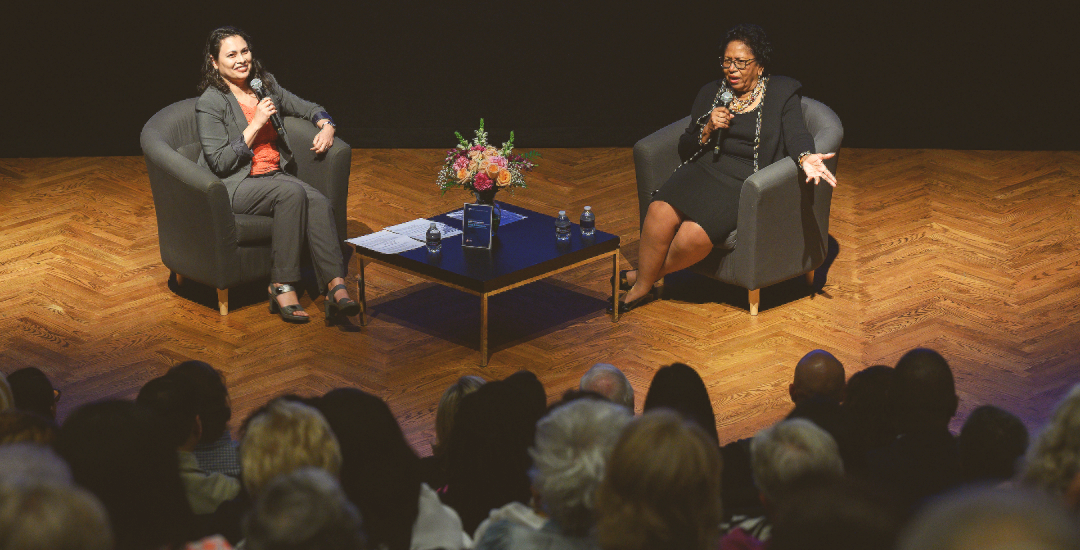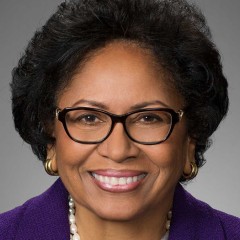Simmons, an authoritative voice in higher education, was the forum’s featured speaker in conversation with Kinder Institute Director Ruth N. López Turley.
“State institutions, where the purse strings are controlled by people who have this agenda, are going to be in a very tough spot,” Simmons said. “That means the private schools have to step up. They are not beholden to state funds, and therefore, they are independent and will have to function independently. It’s going to be a very important time to see what they’re capable of.”
While Simmons acknowledged DEI efforts are not perfect, she said she expects the U.S. Supreme Court to effectively strike down affirmative action this summer when it rules on two landmark cases involving race in college admissions, SFFA v. Harvard and SFFA v. UNC.
“The whole landscape of diversity and affirmative action is about to change,” Simmons said. “The question for us is what should replace it? We better confront that and deal with that and not simply bemoan it. I’m all about finding what the solution is and what the answer is.”
Simmons currently serves as a President’s Distinguished Fellow at Rice University, and as a senior adviser to the president of Harvard University on engagement with historically Black colleges and universities. She previously was president of Prairie View A&M University, Smith College and Brown University — making her the first Black woman to lead an Ivy League institution.
Three years into her tenure at Brown, she created a special committee in 2003 to document the university’s founding family ties to the slave trade. This work served as a blueprint for similar task forces at other universities, including the Task Force on Slavery, Segregation and Racial Injustice at Rice established in 2019.
Simmons’ current role at Harvard builds on her lifelong interest in supporting HBCUs. Due to what she referred to as “chronic underfunding,” HBCUs are unable to provide the same level of instruction and scholarship as competing institutions.
“The most elitist sector in society is education,” Simmons said. “While there are self-proclaimed elite institutions that are proud to say that they have the best and brightest students, I happen to know that the best and brightest students can be found in community colleges and HBCUs.”
Simmons said that since World War II, the engine of research in the U.S. was fueled by grants from the federal government and the states. However, the sources of some funding are changing.
“In order to be able to attract thinkers and innovators, you have to have resources not just to compensate them, but also to fund their work,” Simmons said. “Corporations can fund research; the federal government can fund research and private individuals are increasingly funding research. Recalcitrant states with a legacy of discrimination are unlikely to be the sources of those funds. Somehow Texas has two universities with R2 status that are African-American. Texas could look spectacular if they funded them.”
Simmons also discussed her upbringing as a daughter of sharecroppers and the youngest of 12 siblings in Grapeland, Texas. When she was 7 years old, her family relocated to Houston, where she attended Atherton Elementary School, E.O. Smith Middle School and Wheatley High School in the Fifth Ward. Her background and more will be featured in her upcoming book: “Up Home: One Girl’s Journey.”
She attributed much of her later success to transformational teachers throughout her life. A particular instance occurred when one of her high school teachers invited Simmons to her home and gave her clothes to wear during her freshman year of her undergraduate education at Dillard University.
Simmons said her career path has been inspired by the pivotal role educators play in their students’ lives, and that she hopes her time as a teacher has helped students realize their full capabilities.
“If you’re open to learning, then you can do things that you can never imagine,” Simmons said. “The opening line of my book is ‘I am not the person I was born to be.’ I was born to be someone else who was less than, someone who was invisible, someone who would never be able to achieve much. I am not that person because education and people came into my life. I learned every day. Every day there is something magnificent to be learned.”
The entire Kinder Institute Forum conversation is available below.


